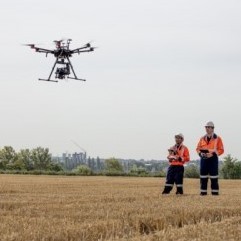
Also in today's EMEA regional roundup: Free says "oui" to 5G; Ericsson makes UK jobs pledge; Telefónica turns to NEC for its German open RAN pilot.
BT is hoping that, in the future, drones will be less the toy of choice for privacy-invading idiots in parks and on beaches and more about useful, commercial applications. The operator is leading a consortium project that seeks to establish the UK's first commercial drone corridor in open and unrestricted airspace to prove that drones and manned, old-school aviation can safely co-exist. Backed by money from the government, "Project XCelerate" will conduct flight trials along the 8km-long corridor near the southern English town of Reading in the summer of 2021, using connectivity from EE, its mobile subsidiary, and drawing on the drone expertise of a number of consortium partners. (See Eurobites: Vodafone, Ericsson trial safe-skies tech for drones and Eurobites: Proximus gets in on the drones act.) Figure 1:
 BT believes drones are useful, and not just ever-so-slightly sinister.
BT believes drones are useful, and not just ever-so-slightly sinister.
(Source: BT)Free, the French mobile operator owned by Iliad, has switched on its 5G network for the nearly 40% of the country's population it currently covers from 5,255 active sites. The operator says it is offering 5G "at no extra cost," including it in existing mobile tariff plans, which start at €9.99 (US$12) a month for Freebox Pop broadband subscribers, rising to €19.99 ($24) a month on a standalone basis. Free is the fourth mobile network in France to flick the 5G switch, after Orange, SFR and Bouygues Telecom.
Ericsson says it will create 800 new jobs through its various 5G buildout projects between now and 2022, though only 250 of those roles will be actual Ericsson employees – the remaining 550 will be delivered through the vendor's "field and resource partners." With Chinese rival Huawei being eased out of the 5G picture, Ericsson now has 5G deployment contracts with all four of the UK's mobile network operators.
Telefónica Germany has chosen NEC as its system integrator for what the operator says is Germany's first open RAN pilot. The trial has already completed a first call via open RAN on a live O2 mobile network in the Bavarian city of Landsberg am Lech. During the pilot, NEC will help to define an open RAN architecture that is adapted to Telefónica's requirements. Other collaborators in the project include ADVA, Altiostar, GigaTera Communications, Intel, Red Hat, Supermicro and Xilinx.
Telecom Italia (TIM) has signed a collaboration agreement with automation specialist Comau, committing the two companies to working together to exploit the potential offered by relevant technologies such as 5G, edge cloud, data analysis, robotics and artificial intelligence for manufacturing. Their first offering, "Industrial IoTIM Powered by Comau," facilitates the monitoring and diagnostics of industrial production machinery, drawing on TIM's "ultrabroadband" chops and Comau's in.Grid platform.
So many alliances, so little time: The Frankfurt-based Next Generation Mobile Networks (NGMN) Alliance has signed an agreement with the O-RAN Alliance in order to "strengthen their relationship and to foster a closer co-operation in the area of Radio Access Network (RAN) decomposition of 4G and 5G networks." Initially, the two bodies will work together on activities related to transport for disaggregated RAN architectures.
Commsworld, which describes itself at the UK's largest independent network provider, has landed a £5.8 million ($7.7 million) contract with Glasgow City Council in Scotland to install, manage and maintain a full-fiber network to support the delivery of CCTV and traffic control services. The network will also support a range of IoT sensor-enabled automation including noise and pollution monitoring.
— Paul Rainford, Assistant Editor, Europe, Light Reading
Read more about:
EuropeAbout the Author(s)
You May Also Like




_International_Software_Products.jpeg?width=300&auto=webp&quality=80&disable=upscale)







